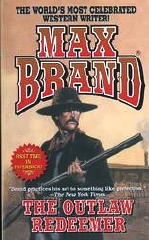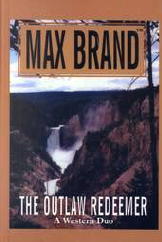Sat 21 Jun 2008
Archived Western Review: MAX BRAND – The Outlaw Redeemer.
Posted by Steve under Authors , Pulp Fiction , Reviews , Western FictionNo Comments
MAX BRAND – The Outlaw Redeemer.
Leisure; paperback reprint, March 2004. Hardcover edition: Five Star, 2000.

In one way or another, most traditional westerns have elements of crime fiction inherently built into their plot structure, and naturally I wouldn’t have brought it up if both of the short novels in the case at hand, The Outlaw Redeemer, did not abundantly qualify, but in different ways.
In “The Last Irving,” which takes place in the more recent Old West – there is electricity in Irvington, and the characters drive proudly around in flivvers – the heir to the non-existent Irving fortune, a city yokel by the name of Archibald, returns from the East to revenge himself on the two crooks who conned his Uncle Ned out of his life’s savings. This a standard tall tale of a (perceived) dumb sap who (it is anticipated) comes out on top by the simple expedient of setting his two opponents one against the other.
While there is more anticipation than there is follow-through, I can’t imagine anyone not finding the ending at least mildly satisfying.
The title story, “The Outlaw Redeemer,” comes with some unexpected surprises, however, making it by far the more enjoyable one of the two.
The opening is nothing more than Biblical in nature, with lots of “begat”s that trace the lineage of the tale’s two antagonists, the pure in heart John Tipton, who becomes a Texas Ranger whose constant quarry is the brutish and devilish criminally-minded Hubert Dunleven, nicknamed either Shorty or Bunch, “both of which were derived from his physical peculiarities.”
Their efforts directed against each other are the stuff that legends are made of – can a western ever be called utterly charming? Dunleven is that rarest of beings, an outlaw with a silver tongue. Take for example, this speech he makes to the beautiful Nell – oh, yes, there is a girl, and of course she comes between them. But first, from page 118, after he has requested that she make breakfast for him, a request she cannot refuse:

Nell is not, however, emphasis not, your usual western heroine. As the two male protagonists of the tale, she also is flawed, and I confess – I admit it – I did not know, with several chapters remaining to go, which way the story was going to come out.
That is it a happy ending, you may rest assured. You may be assured that you will not know in which way it will end happily, but it will.
PostScript: Both of the these stories first appeared in the pulp magazine, Western Story. “The Last Irving” appeared as “Not the Fastest Horse,” as by John Frederick in the November 7, 1925, issue; and “The Outlaw Redeemer” appeared as “The Man He Couldn’t Get,” as by George Owen Baxter in the February 27, 1926, issue.
In some substantial way, I like the original titles better.